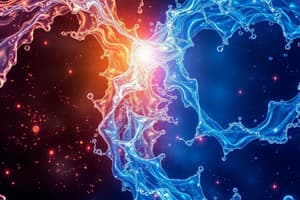Podcast
Questions and Answers
Why is water polar?
Why is water polar?
Oxygen is more electronegative than hydrogen, making oxygen negatively charged and hydrogen positively charged.
Why is water's polarity significant?
Why is water's polarity significant?
It contributes to the fitness of the Earth including cohesion, temperature stabilization, expansion upon freezing, and versatility as a solvent.
What does cohesion mean?
What does cohesion mean?
Holding a substance together.
What does adhesion mean?
What does adhesion mean?
What is capillary action?
What is capillary action?
What is surface tension?
What is surface tension?
What is kinetic energy?
What is kinetic energy?
What is heat?
What is heat?
What is a calorie?
What is a calorie?
What is temperature?
What is temperature?
What is specific heat?
What is specific heat?
What is the specific heat of water?
What is the specific heat of water?
How does high specific heat of water affect temperature in large bodies of water?
How does high specific heat of water affect temperature in large bodies of water?
What is evaporative cooling?
What is evaporative cooling?
What is vaporization?
What is vaporization?
What is evaporation?
What is evaporation?
What is the result of water's high heat of vaporization?
What is the result of water's high heat of vaporization?
What happens to the density of water as temperature decreases?
What happens to the density of water as temperature decreases?
How does the density of water contribute to aquatic life?
How does the density of water contribute to aquatic life?
What is a solution?
What is a solution?
What is a solvent?
What is a solvent?
What is a solute?
What is a solute?
What is an aqueous solution?
What is an aqueous solution?
What is a hydration shell?
What is a hydration shell?
What are hydrophobic/philic substances?
What are hydrophobic/philic substances?
What is molecular weight?
What is molecular weight?
What is a mole?
What is a mole?
What is molarity?
What is molarity?
What is a hydrogen ion?
What is a hydrogen ion?
What is a hydroxide ion?
What is a hydroxide ion?
What is a hydronium ion?
What is a hydronium ion?
What are acids?
What are acids?
What are bases?
What are bases?
What are strong acids and bases?
What are strong acids and bases?
What are weak acids and bases?
What are weak acids and bases?
What is the pH scale?
What is the pH scale?
What are buffers?
What are buffers?
What is the extent of acid precipitation?
What is the extent of acid precipitation?
Flashcards are hidden until you start studying
Study Notes
Water's Polarity
- Water is a polar molecule because oxygen is more electronegative than hydrogen, causing unequal electron sharing.
- This polarity leads to a more negatively charged oxygen atom and positively charged hydrogen atoms.
Importance of Water's Polarity
- The properties of water, such as cohesion, temperature regulation, expansion upon freezing, and solvent versatility, derive from its polarity.
- These characteristics support life and ecological balance on Earth.
Key Properties of Water
- Cohesion: Attraction between water molecules, helping to hold them together.
- Adhesion: Attraction between water molecules and other substances.
- Capillary Action: Water's ability to rise or fall in narrow spaces due to adhesive forces.
- Surface Tension: Resistance to being stretched or broken, allowing some organisms to walk on water.
Energy Concepts Related to Water
- Kinetic Energy: The energy of motion, related to the movement of particles.
- Heat: Total kinetic energy resulting from molecular motion.
- Calorie: The amount of heat required to raise the temperature of one gram of water by one degree Celsius.
- Temperature: A measure of the average kinetic energy of particles in a substance.
Specific Heat
- Specific Heat of Water: 1 calorie per gram per degree Celsius, allowing it to absorb significant heat without a large temperature change.
- High specific heat regulates temperatures in large bodies of water, moderating climate and air temperatures.
Phase Changes and Cooling
- Evaporative Cooling: Cooling that occurs when molecules with higher kinetic energy (heat) evaporate, leaving cooler molecules behind.
- Heat of Vaporization: The amount of energy required to convert liquid to gas, contributing to the stability of temperatures in lakes and ponds.
Density and Water's Behavior
- Water is unique in that it expands upon freezing, forming a crystalline structure that is less dense than liquid water.
- The resulting ice floats, insulating the water below and protecting aquatic life during winter.
Solutions and Concentration
- Solution: A homogeneous mixture of two or more substances.
- Solvent: The substance that dissolves another (e.g., water).
- Solute: The substance that is dissolved in a solvent.
Ion Concentration
- Hydration Shell: A cluster of water molecules surrounding dissolved ions.
- Hydrogen Ion (H+): A positively charged ion formed when an acid donates a proton.
- Hydroxide Ion (OH-): A negatively charged ion present in basic solutions.
- Hydronium Ion (H3O+): Formed when water accepts a hydrogen ion.
Acids and Bases
- Acids: Substances that increase H+ concentration in solution.
- Bases: Substances that reduce H+ concentration in solution.
- Strong Acids/Bases: Fully ionize in water, releasing H+ or OH- completely.
- Weak Acids/Bases: Only partially ionize and establish an equilibrium with their molecules.
pH Scale
- The pH scale ranges from 1 to 14, measuring the concentration of H+ ions in a solution.
- Buffers are substances that stabilize pH by minimizing changes in H+/OH- concentration, crucial for maintaining physiological conditions.
Environmental Impact
- Acid precipitation arises from reactions of sulfur oxides and nitrogen oxides with atmospheric water, impacting ecosystems.
Studying That Suits You
Use AI to generate personalized quizzes and flashcards to suit your learning preferences.




